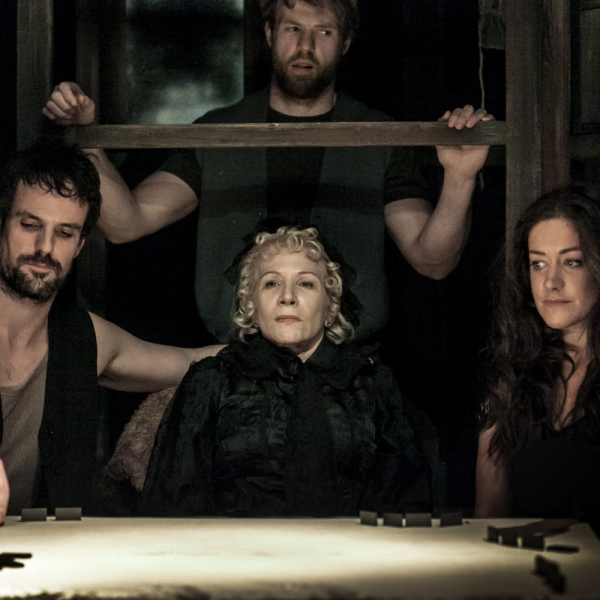Thérèse Raquin (Finborough Theatre)
Emile Zola’s tale of sex, murder and self-destruction reaches the stage in a fiery new musical

© Darren Bell
If it’s gothic nastiness you’re after, Emile Zola’s compact 1867 novel delivers in bloodied spades. Thérèse Raquin has been dramatised numerous times before – not least by the author himself and twice more recently as operas – and its mood of heightened psychological horror makes it strong raw meat for a musical thriller.
That, famously, is how Stephen Sondheim described Sweeney Todd, a show whose mood Nona Shepphard‘s new "radical adaptation" at the Finborough Theatre occasionally resembles. Like Sweeney, Thérèse Raquin begins with a choral flashback before embarking on a study of two people on a spiral down to hell.
Thérèse endures a suffocating marriage to her cousin, Camille, under the roof of his smothering mother. The only relief from boredom is the weekly visit of Camille’s colleagues for a game of dominoes. On one such evening they are joined by the handsome Laurent, whereupon bad times start to roll.
The focus of Zola’s story is less Laurent and Thérèse’s illicit passion than the aftermath of a murder during which the pair are haunted by guilt. Its pages are suffused with a malevolent tension that Shepphard never quite captures.
That opening flashback is a problem: it gives away the ending. Unlike the Greek tragedy structure of, say, Blood Brothers, Zola’s novel relies on the suspenseful unfolding of its story, but that is neutralised from the get go. As for the murder itself, it happens while the audience is enjoying an interval drink downstairs in the newly-reopened bar.
This removal of surprise and shock makes it hard to engage with the characters’ oppressive emotions, so they become ciphers. It doesn’t help that after unpacking a leisurely first act Shepphard confines the couple’s hallucinatory nightmares – the great horror at the story’s heart – to the final minutes of the show, almost as an afterthought.
Yet it’s far from a disaster. True, there are too many narrators for such a self-propelling story and director Shepphard’s self-penned lyrics are flat and functional; but she and designer Laura Cordery achieve a startlingly bleak atmosphere within the Finborough’s tiny confines.
The tale hurtles onwards thanks to a marvellous, nervy score by Craig Adams that never finds repose, its meanderings punchily played on the keyboard by James Simpson and delivered with authority by a cast of (mainly) superlative singing actors.
Julie Atherton in the title role suffers in silence for long periods before erupting into feral passion. As the object of her desire, Ben Lewis (best known as the Phantom on the Australian DVD of Love Never Dies) is both physically and vocally magnetic. Small wonder Thérèse abandons Camille (the excellent Jeremy Legat) for such a hunk. This trio’s effective physical work, including a notably good morgue scene, goes a long way to offsetting the dramatically redundant Act One closer, "A Sunday Stroll", and the overwritten soliloquys of Madame Raquin, several of which overtax the expressive Tara Hugo.
Only a partial success, then, but enough of Zola's unblinking tale survives to seize the unwitting spectator in its cold, dead grip.












